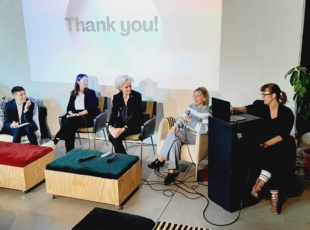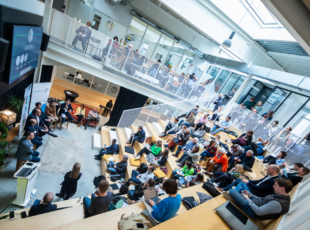Generative AI, augmented reality and female empowerment on the SXSW programme
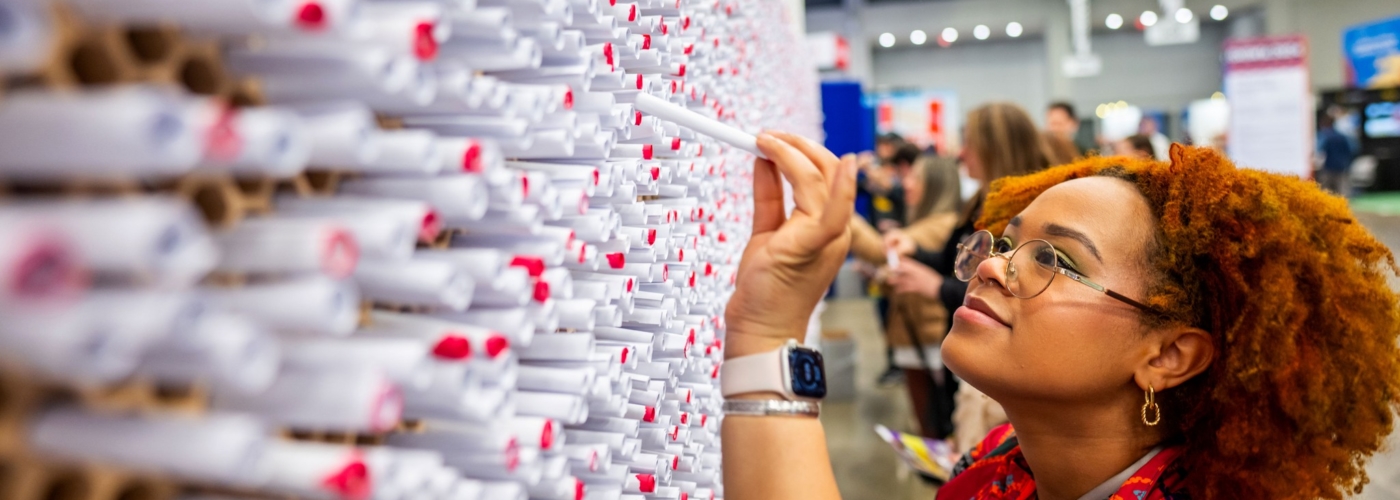
Article author :
From March 7 to 12, kingkong was in SXSW, in Austin, Texas. A festival of music, cinema and emerging technologies considered the largest digital, innovation and creativity gathering in the world. On site there was a Walloon delegation to keep tabs on… but we couldn’t resist all the lectures, panels and podcast recordings we could attend. An overview.
March 7, arrival at the destination. Somewhat weary after the two flights and the mild panic induced by the Electronic System for Travel Authorization at Chicago airport, we decide to touch down at the hotel to prepare for tomorrow’s programme. March 8, the day begins with a Belgian breakfast, attended by the majority of the Walloon delegation. It is very quickly time to head for the Convention Center, where the festival’s IN programme is taking place, to pick up our passes. Through the intercession of the Walloon Export and Foreign Investment Agency (AWEX) and WBI (Wallonie Bruxelles International) – many thanks to them! – kingkong has an Interactive pass, the Holy Grail for the curious such as us, as it means we have the opportunity to attend a maximum of lectures. The first one we will go to see is called ‘Teens, Screen and Wellbeing: Youth in the Digital Age’. The findings are clear: social connection is essential to our survival, in the same way as water is. And yet, today, despite our over-connection, people have never been so isolated. A quarter of adolescents feel alone and are increasingly prone to suffering from KOMO (Knowledge of Missing Out), the realisation that they have not been invited to something. The challenge is integration. And the paradox is that the apps which have created this isolation are today working to diminish it. The serpent biting its own tail, in a nutshell.
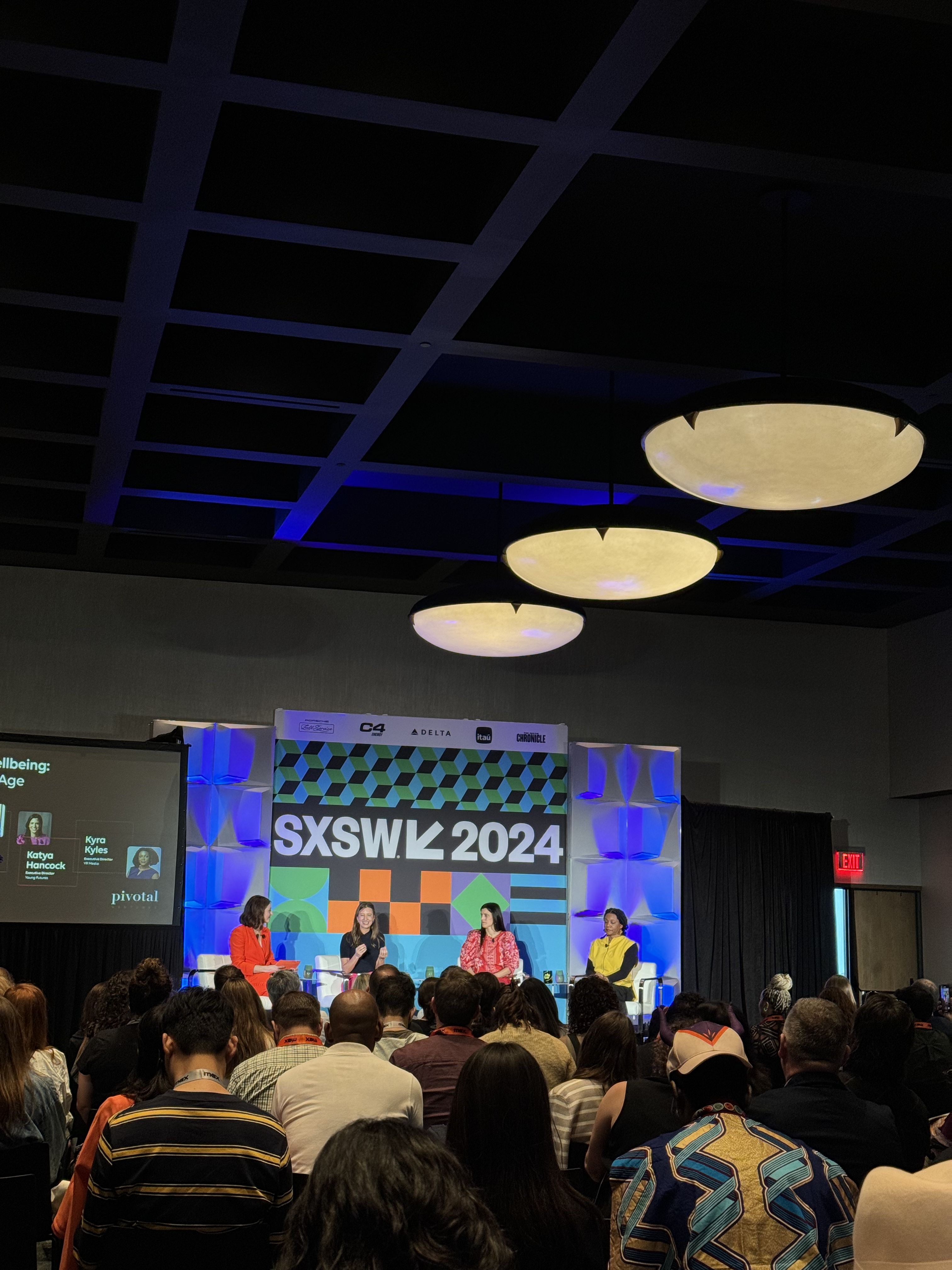

Don’t say Woman’s Day
Immediately afterwards, a Keynote panel which couldn’t have been better timed on this International Women’s Day – and not Woman’s Day or Festival of Women, as we have heard it called…: ‘Breaking barriers, shaping narratives: how women lead on and off the screen’. The panel of women speakers is impressive: Meghan Markle, the Duchess of Sussex, Katie Couric, Errin Haines, Brooke Shields and Nancy Wang Yuen. In terms of empowerment, we couldn’t have imagined better. The issues raised during this Keynote panel are diversity, representation, age, harassment on the social networks… with this message: if you read something negative about a woman, why are you sharing it? Even if it’s making dollars, it doesn’t make sense. This round table is more than inspiring. We come out of it feeling powerful, and with the confirmation that ‘every large movement has begun in a small room with a small group of people’.
These 100% female and empowering panels are amongst the firm favourites of Alexandra Gérard, managing director of Stereopsia. ‘Generally speaking, I felt a super positive energy. I am delighted with this first experience. But also frustrated and I’ve got a massive FOMO (Fear Of Missing Out) because there are so many things to see at the same time. I hope I will be able to return next year.’
After these panels, the Belgian delegation gathers on a rooftop for a networking session with participants from all four corners of the planet. On the programme: Belgian beers, a presentation of Walloon events, such as the KIKK Festival and Stereopsia, a Texan barbecue and a live band.
March 9, back to the Convention Center. Talks on THE subject of the moment are beginning: generative artificial intelligence. Phil Wiser, executive vice president & chief technology officer of Paramount Global, talks to us about the challenges and opportunities the media industry is today being presented with. His message? AI will have an impact on every stage of the process, in pre-production, production, post-production and streaming. In his opinion, Generative AI is an aide for creation, which enables the development of a less linear and therefore more rapid timeline. For the moment, it is a human being who signs off on the final product, and he hopes that it will stay that way.
Damien Van Achter, a freelance consultant in the domains of media, education and entrepreneurship, followed this lecture with a lot of interest. Afterwards, he is anxious to raise an important point: the need for content producers to be able to authenticate that the content belongs to them. ‘With this oncoming wave of generative AI, the distinction between what has been generated by a human being and what a machine has produced is difficult. We were already using a lot of AI in the past. But the business models of the media are broken and they will have to be reinvented, so we may as well do so with the tools of today. Copyright royalties, related rights, they are all in the process of evolving, but I don’t have the impression that we will come out on the other side of this issue without a radical innovation.’
Artificial intelligence is also THE trend at SXSW in 2024, according to Héloïse Devaux, business development director of La Grand Poste. ‘And I think that corresponds very strongly with what we are doing at La Grand Poste. There is a tendency to say that we have already talked about it enough, but no. It’s a subject with so many facets, different angles of approach. A central subject we still need to explore. And when it is the main theme in our creative hub events, these talks are always sold out.’
The best of the both worlds
In another panel, three artists call it as they see it: this AI must be considered as an additional option. Tanne Gehm, Pratik Suketu Shah and Adriana Vecchioli are of one mind; it is vital to take ‘the best of both worlds’, and to see AI and XR as extra tools in the creative process. For that matter, this is not a new thing. To offer an example, they cite films from the 1990s, such as Roger Rabbit and The Mask, which were already blending real images with VR. Their advice to artists? Play with these tools, experiment and then decide, yes or no, if you are going to incorporate them into your process. And then, as they point out, if these tools develop in the right way, they will be a good deal more ethical than directing humans or animals who may risk getting injured during filming.
‘AI paired with XR is going to do something pretty incredible,’ enthuses Salvatore Bordonaro, Immersive Designer and project leader at MiiL, on leaving this panel. ‘The talks I have attended have made me aware that we are on the cusp of a change far greater than I had imagined,’ confirms Pierre Collin, executive manager of TWIST. ‘This is not a “Brice de Nice” ripple, but a tsunami. As a passionate Walloon, I’m always sad to see that there is so little audiovisual and multimedia content offered to the Walloons and to the world. I am now conscious that this period of scarcity is over, and that we will finally have meaningful clout on the contents planet.’
Mental health and well-being
Day 3, we have breakfast with the French delegation. There, we in particular meet up with Adrien Bisset, CEO and Cofounder of DANC.R. An app which accelerates the workouts of dancers by measuring their progress. Shortly afterwards, it’s back to the Convention Center for the recording of Mayim Bialik’s podcast – you know, Amy Farrah Fowler in The Big Bang Theory? An actress and neuroscientist, she co-hosts Mayim Bialik’s Breakdown, a podcast on mental health, with Jonathan Cohen. For an hour, they talk about the power of positive thinking, altered states of consciousness and the fact that we are all part of something much bigger than us.
To listen to this very interesting recording, it’s here.
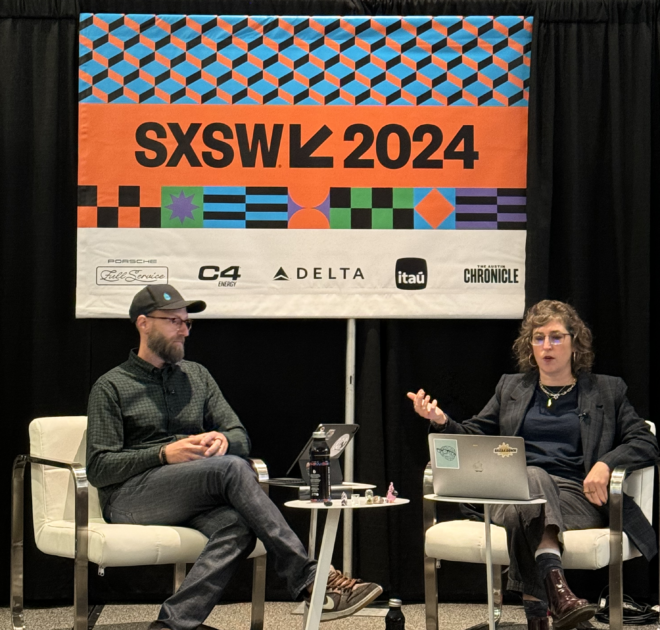
This relationship between art, tech and well-being, which is very prominent at SXSW, is what particularly appeals to Gwenaelle Gruselle, international business developer at Dirty Monitor. ‘In the programming, there are obviously subjects which are very ‘now’, such as non-binarism, inclusion, etc. and I was very touched by the fact that a genuine dimension of well-being is included. What I also love about the programme is the breaking down of the walls between disciplines, because they are all important in my opinion, and it’s cool to be able to get down to the details of it all.’ Sébastien Nahon, the director of MIIL, pursues the theme. ‘Amongst the genuine trends this year there is reflexivity. You can sense a stepping back in relation to the perception of the world. As if we were reaching a tipping point where we say: we are not going to do the same kind of bullshit we did when the web was launched. I sense a pause for thought is happening, as if tech has gained in social maturity.’
Damien Van Achter, for his part, is concerned about a subject too little discussed but nevertheless latent: brain computing (by which is meant controlling external devices via the cerebral system). ‘For the moment, our telephone or our computer is our computer assisted brain. But tomorrow, Neuralink will enter our brains. Whether the pretext is health or sleep optimising, we know that the augmented human is one of the dreams of science fiction which certain companies have harboured, and today it is becoming a reality. I think that we will really witness a form of polarising and extreme dichotomy between those who can afford it and the rest. In my role as a critical observer, I wonder if it isn’t time that the politicians got a grip of it and get to understand the underlying issues, to be able to properly set guidelines on it.’ So many subjects discussed during Belgian Happy Hour, at La Mort Subite – that is also what SXSW is about, talking about serious and interesting subjects around a Belgian beer.
Inclusion and diversity
On Day 4, we take a little bit more of female empowerment with a panel on the ways in which women entrepreneurs can dominate the world of the start-ups of tomorrow. Four women more badass than the next issue their advice: believe in your intuitions, trust yourself, don’t let anyone tell you what you should do, have the daring to grab your place in a business world dominated by men.
As Gwenaelle Gruselle said above, numerous very contemporary themes are tackled during the festival’s IN component. And that is something we were not expecting. Feminism, inclusion, diversity, trans identity, non-binarism, food alternatives, etc. All subjects we adore at kingkong. But it is not just us who are thrilled about this. The firm favourite of Damien Van Achter is a panel on… the marketing rolled out for non-alcoholic drinks. ‘It’s fascinating because they talk about inclusion. It’s just under a year that I’ve been enjoying testing out things. In general, at restaurants, it’s disappointing. So, it’s interesting to hear that in the US, there is a completely new industry which is developing with thoughts on retailing: how to showcase these products? If innovation helps us to pay attention to what we eat, what we drink, what we breathe, by including a maximum of people, then in my opinion it’s going in the right direction.’
To end, let us note the near total disappearance of several of the trends of previous years. Metaverse, NFT, Blockchain, and more. AI, on the other hand, is on every street corner. ‘You come across a dog, and you wonder if it’s an AI,’ jokes Gilles Bazelaire.
A story, projects or an idea to share?
Suggest your content on kingkong.

